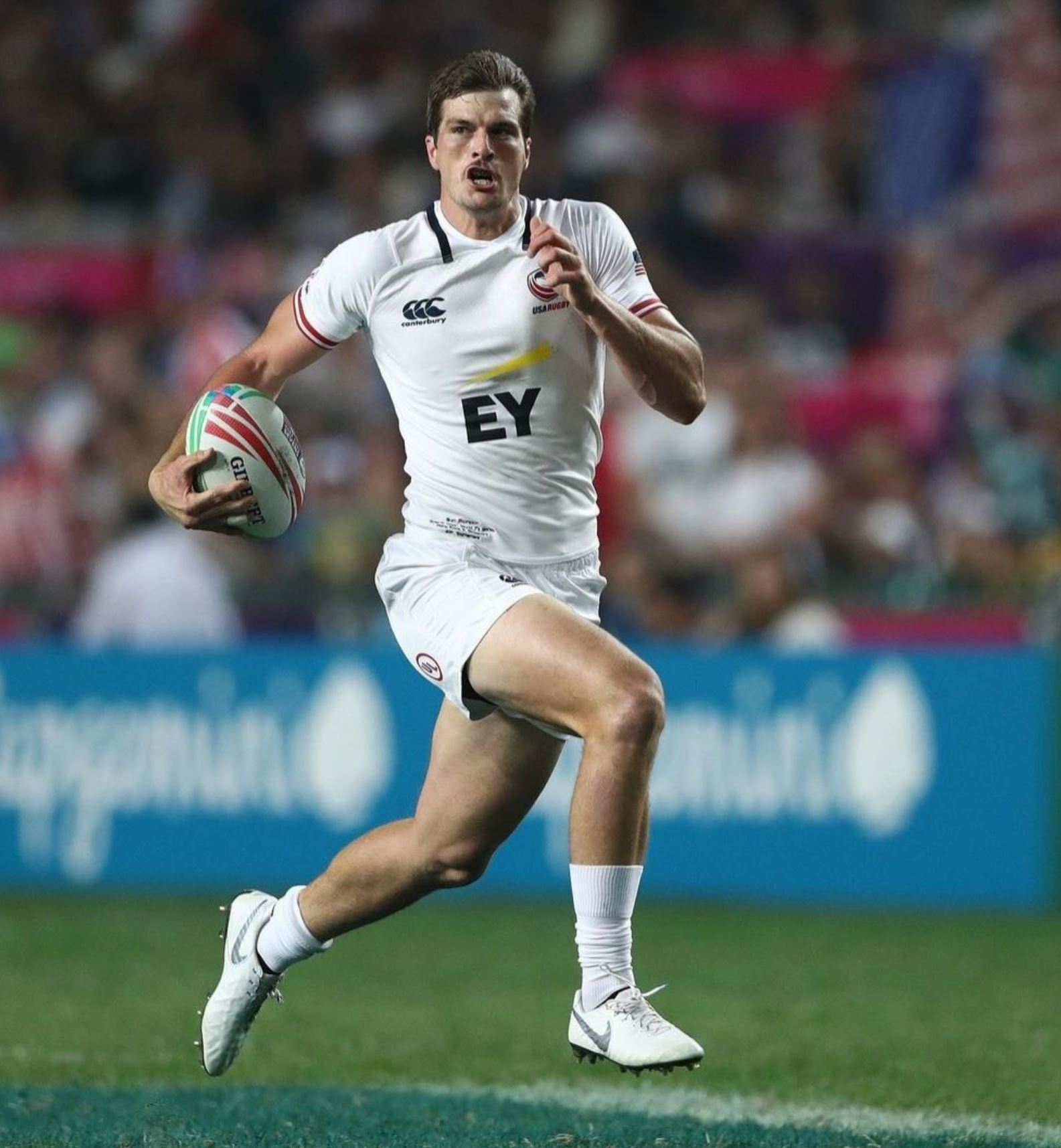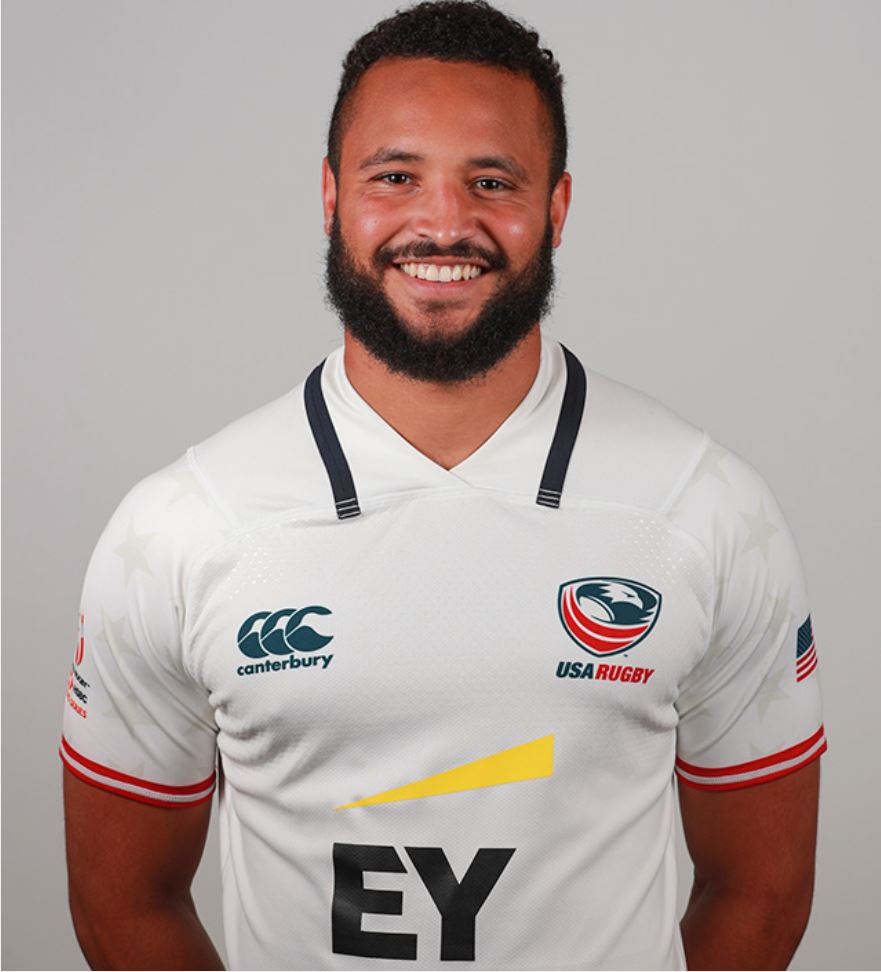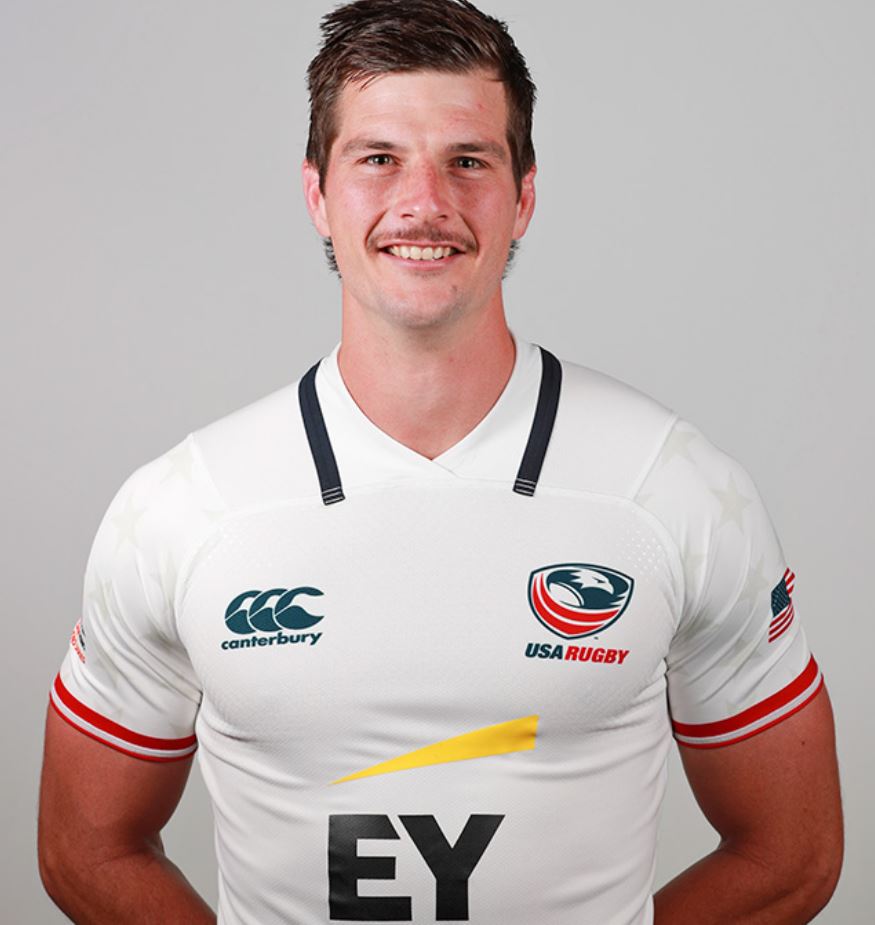
As the hulking figure thundered toward the U.S. goal line toting something resembling an oversize football, Brett Thompson was epitomizing what it’s all about in the sport of rugby sevens: Try.
Thompson, who turns 31 on Aug. 17, had been trying for some time. And trying some more.
And on this 15-meter jaunt for the U.S. in a pool-play game against South Africa in the Tokyo Olympics last week, he had to try especially hard as three South African players caught up to him and attempted to tackle him about 5 meters from the goal. The 6-foot-4, 225-pound Thompson, looking like a U.S. football fullback on a dive play, dragged them all in and scored, which in rugby is known as a “try” and counts 5 points.
“What a run! What a try!” the NBC-TV crew gushed.
Thompson is from Marcos de Niza High. He has been on the U.S. senior national rugby team for nine years, although sidelined by injuries for four of them. Repair of torn anterior cruciate ligament. Both knees. Reconstruction of a shoulder. Foot injury. And he’s back.
Pads and helmet? Meh. Those are for the high-priced prima donnas in American football. These guys mix it up with only shorts, shirts and cleats, pounding, blocking and tackling with no protection in a physical, collision sport that is not for the weak or for anyone with a low tolerance for pain.
Thompson initially was selected to the U.S. Olympic team as an alternate but was promoted to the active roster for the Games in early July after teammate Ben Pinkelman’s lingering back injury required surgery.
So there he was for the whole world to see. Among those tuned in at 2:30 a.m. Arizona time for the quarterfinal game against Great Britain was his dad, Wilbert “Salty” Thompson, who is among the most-noted rugby coaches in the country and a 2021 inductee into the U.S. Rugby Hall of Fame. Salty and his wife still live in the same South Tempe house near Kyrene and Guadalupe where they raised Brett.
A few days earlier, Salty Thompson had been in Salt Lake City at a youth-rugby tournament and snuck away to watch the Olympics opening ceremonies on television.
“It’s hard to describe the feeling,” Salty Thompson said. “I was watching, and then there was Brett. I thought, oh my God, this is happening.
“Then he took the field and played really well. How often does this opportunity come, especially at his age after what he went through to get there? There are only about 600 U.S. Olympians in a country of about 300 million.”
Another of them is Maceo Brown, 25, a Corona del Sol High graduate, who played two years on the club rugby team at Grand Canyon University and now is a starter on the U.S. Olympic team.

The U.S., while not yet a world power in the sport, true to rugby gave it a try. It won its first two games in Olympics pool play last week, over Ireland and Kenya, before falling to South Africa, still reaching the quarterfinals and needing a win there over defending silver medalist Great Britain to play for a medal.
The U.S. roared to a 21-0 lead and appeared headed for a monumental upset. Then, Great Britain scored with 10 seconds left in the first half and in the second got two quick, easy scores en route to a 26-21 comeback victory.
The Americans then beat Canada to reach the fifth-place game, where they fell again to South Africa.
The U.S. team’s sixth-place finish was an improvement on its ninth place in the Rio Olympics in 2016.
“We were all looking to bring a medal home,” Brown said in Tokyo in an interview with USA Rugby.
“The experience was great, amazing, coming in and seeing all the athletes everywhere, all the flags in the village, getting in some sightseeing, the opening ceremony. It’s a great experience.”
Salty Thompson coached both Tempe Olympians.
TEMPE A CLOSET HUB OF RUGBY
Who knew that Tempe was such a national hub of rugby?
It’s a well-kept secret, but the emergence of Brown and the younger Thompson coupled with the legendary coaching and administration of the elder Thompson has put the area on the rugby map.
“It’s a quiet amateur sport but we have nurtured quite a lot of top-level players here over the years,” Salty Thompson said. “Tempe Rugby has been around since 1980. We get them started. It’s unfortunate that they then have to go somewhere else to develop. We just export them. But we do have a really, really strong youth program, and (coach) Hal Morgan has taken them to the high school national tournament.”

Thompson, 66, was soccer and cross-country coach for nearly 23 years at Westview High in Avondale. He has coached numerous U.S. national rugby teams in all age groups. He now is director of Eagle Impact Rugby Academy in Tempe, where he identifies and develops the next generation of young American players who continue to close the gap on world leaders in the sport. He has coached 45 All Americans and sent more than 40 players on to U.S. national teams.
A native of Ireland, Thompson came to the U.S. to get his master’s degree at Arizona State, where he played on and coached the club rugby team. Before that, he played rugby at Loughborough University in England, where he also ran the 400 meters on the track team with middle-distance Olympic medalist and world recordholder Sebastian Coe.
“We’re a nation that loves our medals, and when we fall short it’s disappointing,” Salty Thompson said. “But the Olympics is great exposure for our sport. The culture of the sport sells well to the public. And there’s curiosity. Kids see it and say to themselves, ‘I wouldn’t mind having a go at that.’”
Rugby sevens, for men and women, is in the Olympics for only the second time, having made its debut in Rio in 2016. Rugby, with 15 players to a side in an 80-minute game of two 40-minute halves — also known as rugby union — was in the Olympics until being discontinued after the 1924 Games in Paris.
Rugby sevens is seven players per team in a 14-minute game of two 7-minute halves, but played on a regulation-size field. It is faster and more free-flowing than rugby union, requiring speed, which is why the U.S. team nearly reached the medal round.
And that’s what makes the speedy Brown, a multi-sport player while at Corona, valuable.
“He’s a talented guy, but he wasn’t the easiest kid to coach,” Salty Thompson said. “We joke about that now.”
Brandon Thompson, who is no relation to Salty or Brett, but who played rugby with both of them as well as with Brown, takes it a step further.
“Instantaneously, his talent really showed,” Brandon Thompson said of Brown. “What Maceo really needed was a mentor within the rugby community. A lot of times, being polished and being disciplined are two different things. Salty really steered Maceo, really encouraged him, sometimes redirected him and really pushed him in his rugby career.”

Brown, at 6-foot-1, 200 pounds, quickly drew the attention of national and international scouts while on the Grand Canyon club team. During his senior year at GCU, he took online classes while preparing full-time with the USA Development Team.
“It’s an honor to be selected as one of the lucky few representing this great country,” Brown said. “There have been so many ups and downs on this journey to becoming an Olympian, but one thing that never wavered was my faith in God, in humanity and, most importantly, in myself.”
Brandon Thompson and Brown played on the 2018 national championship team together.
“Now, I’m a fan of Maceo like everybody else,” Brandon Thompson said. “Maceo is highly competitive and he has a deep desire to succeed, and that’s what pressed him forward.”
Brandon Thompson, 41, is an English teacher as well as cross-country and soccer coach at Tempe High. He also is director of player development at Tempe Rugby Club.
“We are not a tier 1 rugby nation yet,” Brandon Thompson said. “But the nice thing about sevens is its only 14 minutes long. So is it possible for the U.S to make a run? Absolutely, because it’s more of a free-flowing game and we do have a fair amount of speed on that team. That’s the great equalizer in every game.”
It’s still a physical game, too. That’s what makes Brett Thompson valuable.
On his twitter page, he describes himself as “half human, half robot.” He made his point with that brute-force finish for a try in the first game against South Africa that left the NBC-TV commentators aghast.
“Join the party,” Salty Thompson said. “He’s just so big and strong. He’s healthy for this Olympics, which is fantastic since he missed the last one. I’m very proud of him. But my wife has a rule: We don’t talk rugby over dinner. When it comes to Brett, I’m just dad.”
Brett Thompson went from Marcos to the University of Arizona as a preferred football walk-on, recruited by former coach Mike Stoops. After two seasons playing special teams, Thompson shifted his focus back to rugby.

“I’ve known Brett since he was a little boy,” said Brandon Thompson, the Tempe High teacher-coach. “I watched him grow up and I was his teammate for a while. He was a wonderful football player, just a great athlete. He always had rugby on the back burner.
“With Salty as his father, Brett is a real student of the game. He’s very hard working but very coachable. Now, he pops in on our youth camps when he comes back. He has worked himself into being one of our country’s best rugby players.”
Seeing successes like those of his son and Brown keep Salty Thompson going at 66.
“It’s the possibilities and the character development in the sport,” he said. “It takes a certain mentality to even want to play rugby.”
For Brandon Thompson, it’s the humility and camaraderie that are the hooks.
“Honestly, all the wonderful things in my life came from rugby,” Brandon Thompson said. “I met my wife. She played. Salty became my coaching mentor. He coached soccer and cross-country, and now that’s what I do.
“In rugby there is no real showboating. These guys push themselves. They’re willing to work hard. I honestly think rugby is one of the greatest team sports in the world. It is a wonderful outlet for physicality, for speed and then for community. Afterward, you hang out with your opponent and talk to each other. We play this physical, almost violent, sport all these minutes and we still get together and respect each other as human beings. You belong to something greater that builds positivity rather than negativity. That’s really what draws all of us to it.”


